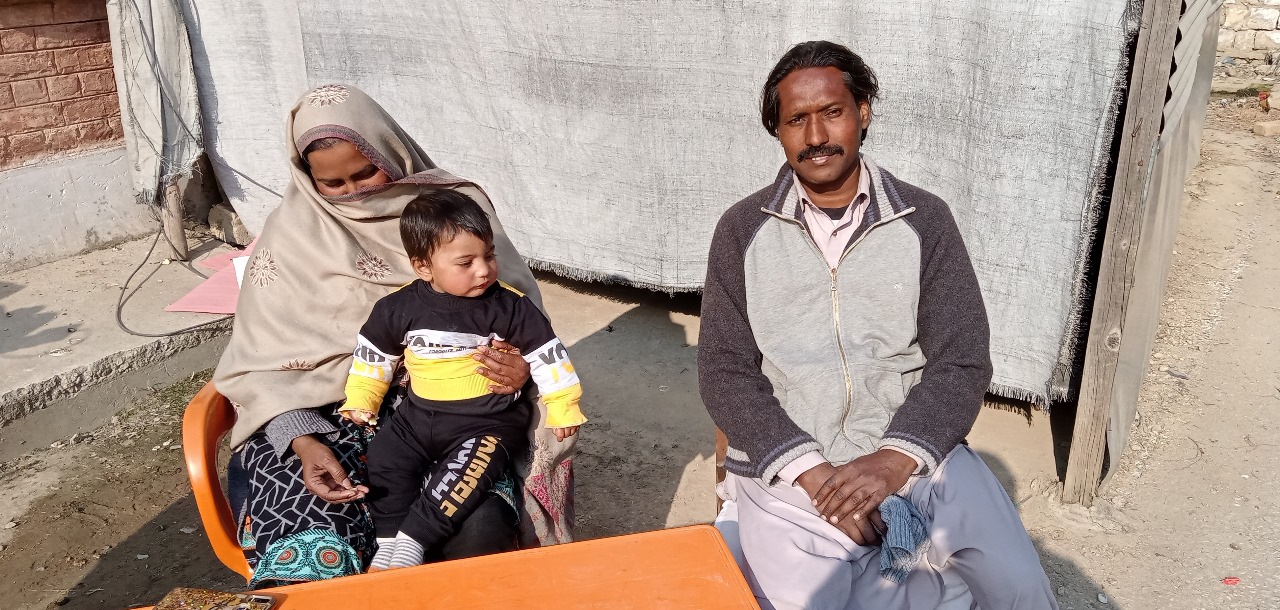Sana Parvez Masih: Bridging Faiths & Breaking Barriers in Bajaur
Shah Khalid Shah
Bajaur: On a sunny January afternoon, 26-year-old Sana Parviz Masih sits with her husband and two-year-old son under an open sky in front of their home. The serene family scene in the small village of District Headquarters Khar, Bajaur, appears typical at first glance. However, Sana’s story sets her apart from the ordinary.
Sana Masih, an elected councilor, is on a mission to build trust among communities and foster closer relationships. In September 2021, she was elected unopposed as a councilor on the ticket of the religious political party Jamaat-e-Islami (JI), in the remote tribal district of Bajaur in Khyber-Pakhtunkhwa (KP).
Her goal as a councilor is to promote religious harmony among her neighbors, community, and district.
According to the District Election Commission office, Bajaur has a population of approximately 1.3 million. The district comprises eight tehsils, 120 village councils, seven neighborhood councils, and 127 reserved seats for women.
Sana Masih knew that her journey as a councilor in Bajaur would not be easy. Describing the region as a ‘backward and conservative’ area where both Christian and Muslim communities face significant challenges, Masih shared her desire to help solve these issues motivated her to run for office.
Determined to make a difference, Masih submitted her nomination papers and conducted a vigorous campaign, even though she was running unopposed. Initially hesitant to engage with the Muslim community for votes, she was unsure of how they would receive her.
However, her visits to the community, especially meeting with women, garnered a positive response. Many women expressed their admiration for her determination and pledged their support, while some male voters also extended their backing.
Masih’s election has since become a model for fostering interfaith harmony. Before taking office, she described her family’s relationship with the Muslim community in her constituency as “superficial.”
However, since her election, those bonds have significantly strengthened, illustrating how people of different faiths can work together for mutual benefit.
Sitting under the open sky with her husband and two-year-old son, 26-year-old Sana Parvez Masih, a councilor in Bajaur’s District Headquarters Khar, juggles family life and her mission to bring communities closer.
Her election in September 2021, unopposed on a Jamaat-e-Islami ticket, marked a significant step for the region’s Christian minority.
Building Bridges Between Communities
Sana’s focus as a councilor is promoting interfaith harmony in Bajaur, a region she describes as “backward,” where both Christian and Muslim communities face serious challenges.
Initially hesitant to seek support from the Muslim community, she was met with unexpected encouragement, particularly from women, who admired her determination and pledged their support.
Before her election, her family’s relationship with the Muslim community was limited. Now, they are considered part of the constituency, regularly invited to weddings and other events.
According to Jameel Bismil, general secretary of Bajaur’s Christian community, the 37 Christian families in the district have lived in harmony with Muslims for years.
A Voice for Women
Masih has become a trusted advisor for women in her community, who often approach her with employment concerns. Without a formal office, she has turned part of her home into a space where women can share their problems.
To support their economic empowerment, Masih has engaged with the Vocational Training Center for Women in Civil Colony Khar, advocating for programs in embroidery, tailoring, and entrepreneurship to help women earn a livelihood.
Masih has also approached the chairman of her neighborhood council to address broader community issues. However, progress has been hindered by delays in the release of development funds.
Despite her growing influence, societal barriers remain. The strict traditions of Pashtun society prevent women from speaking openly to the media, reflecting the male-dominated nature of the region.
Yet Masih has earned praise from her male colleagues, including NC-3 Mirali Qila Khar Chairman Haji Anwar Hussain, who describes her as “an active councilor who raises women’s issues and offers practical solutions.”
Renowned researcher Anwar Nagar highlights Masih’s election as an important step toward social diversity, calling on all political parties to nominate candidates from minority communities to promote inclusion.
Inclusive Leadership
Masih’s affiliation with Jamaat-e-Islami, a religio-political party, reflects her belief in its principles. Deputy General Secretary Maulana Sanaullah notes that her ticket was granted on merit, demonstrating the party’s commitment to religious harmony.
Prominent religious scholar Maulana Noor Muhammad Benori also emphasizes Islam’s teachings on minority rights, stating that such representation paves the way for societal development.
A Vision for the Future
As a mother of four, Masih balances her household responsibilities with her political role, supported by her husband, Asif John Masih. Her husband, who actively assists with childcare and housework, shares her vision for community service.
He revealed that Masih aspires to become a Member of the National Assembly or Provincial Assembly to better serve her constituency.
Masih has vowed to continue advocating for the timely release of development funds to address community needs and strengthen interfaith harmony. “I do not want to lose the trust and mutual brotherhood expressed by the people who supported me,” she said.
Sana Parvez Masih’s journey reflects the potential for unity in diversity, serving as an inspiring example of how communities can come together to overcome challenges and build a harmonious future.
Photo Credit: Shah Khalid Shah
Shah Khalid Shah is a journalist based in Bajaur, reporting for leading media organizations.

Comments are closed.